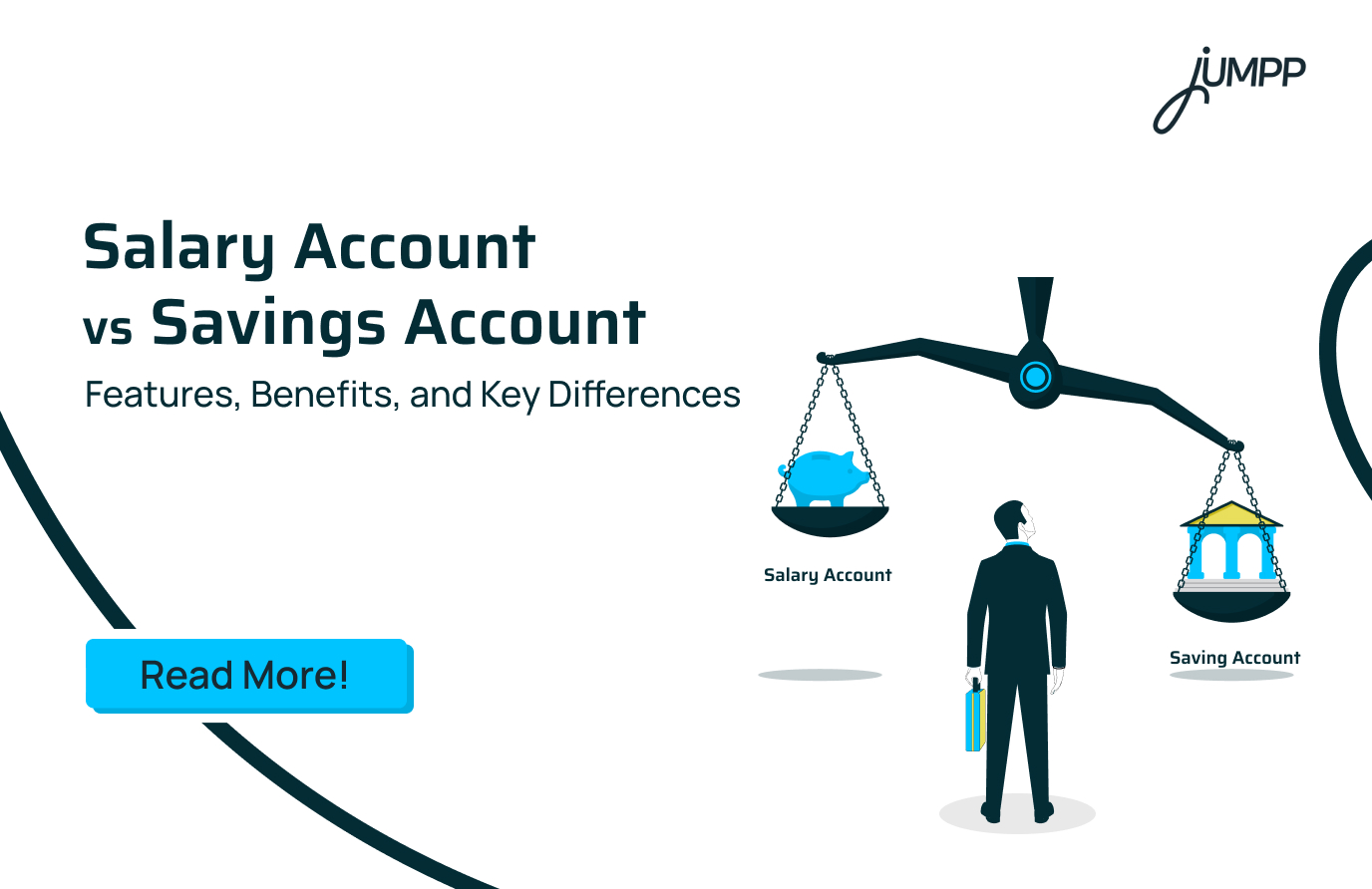Salary Account vs Savings Account: Features, Benefits, and Limitations

When a person starts earning in India, one of the first financial conversations at home usually begins with a simple question: “Beta, salary ka paisa kis account mein aata hai?” or “Papa, office ne salary account banaya hai. Bank se message bhi aa gaya.” This small exchange is common in almost every household. Parents often ask their children about salary accounts and whether their salary would be safe in them. This happens because most of us don’t know the real salary account vs savings account difference. Since childhood, we have only been told to open savings account online.
Both accounts are basic yet essential tools in the banking system. They may look similar, but the way they are used, the benefits they offer, and the reasons people open them are quite different.
In this article, we will explore the difference between salary account and savings account.
Salary Account vs Savings Accounts
A salary account, as the name suggests, is mainly for receiving your monthly salary from your employer. It usually comes with a zero minimum balance. This means that you do not need to keep a fixed amount of money in it.
On the other hand, a savings account is your personal account. It helps you save money, earn some interest, and use it when needed.
Savings accounts mostly have a minimum balance requirement, unless it is a zero-balance scheme.
Open your zero-balance savings account today!
One important point to note is that if no salary is credited into a salary account for a few months, the bank may convert it into a savings account. That’s why many people prefer to have both types of accounts.
Key Differences Between a Salary Account and a Savings Account
A salary account is a type of savings account with special features linked to your job. The most common is a zero balance requirement.
Here is a quick difference between salary account and savings account.
| Feature | Salary Account | Savings Account |
| Purpose | To receive your monthly salary directly from your employer, who usually has a tie-up with the bank | It serves the purpose of saving money, managing daily expenses, and building wealth over time |
| Minimum balance | Almost always zero balance, so there is no penalty if your balance falls to zero | This usually requires a minimum balance. Penalties apply if not maintained. The amount depends on the bank and account type |
| Account opening | Your employer opens this with their partner bank, or you can open it yourself with employment proof | Can be opened by anyone who meets the bank’s eligibility and KYC requirements |
Similarities Between the Two Accounts
Even with their differences, salary and savings accounts share many features:
- Earn interest: Both accounts earn interest on the balance. However, the bank interest rates vary.
- Standard banking services: Both give access to debit cards, cheque books, net banking, and mobile banking.
- Electronic funds transfer: You can send money through NEFT, RTGS, and IMPS in both accounts.
- Deposit insurance: Funds in both accounts are protected under central bank regulations.
What is a salary account?
A salary account is a type of bank account specifically designed for employees to receive their monthly salary. In India, companies tie up with a particular bank and open salary accounts for their employees. Employees do not usually choose the bank themselves; the employer does.
- This account can only be opened by salaried individuals. It is used to credit the salary directly every month
- Banks often provide extra benefits like free debit cards, higher withdrawal limits, and personal loan offers
Features of a Salary Account
- You are not required to maintain a minimum average monthly balance.
- If no salary is credited for a certain number of months, usually three, your account may be converted into a regular savings account.
- Like a regular savings account, a salary account also offers online and mobile banking services.
- Not only this, you will also receive a debit card, a personalised cheque book, and access to online banking for withdrawals, payments, and tracking transactions.
Benefits of a Salary Account
- Banks often offer salary account holders easier access to loans such as personal, home, or auto loans with faster approval and better interest rates.
- Many salary accounts include complimentary insurance. This could include personal accident, air accident, permanent disability cover, etc.
- You can easily link your salary account to a demat account for investments.
- Banks provide exclusive offers, rewards, and cashback on debit card spending. This may include discounts on shopping, dining, and travel, as well as lower locker rental charges.
- Some salary account packages allow you to withdraw more than your available balance up to a certain limit.
What is a savings account?
A savings account, on the other hand, is the most common and basic type of bank account available to every individual. It is meant to keep your money safe while also earning a small amount of interest.
- It is available for all.
- A savings bank account allows deposits, withdrawals, and fund transfers
- You earn a decent interest on your balance
- Banks usually require a minimum balance (though some offer zero-balance savings accounts)
- It helps inculcate the habit of saving.
So, if a salary account is more of a necessity linked to employment, a savings account is a universal option available to all.
Features of a Savings Account
A savings account is a basic bank account that every individual is asked to maintain since childhood.
- Your savings account balance usually offers an interest of around 2.5-6% pa.
- You can enjoy the facilities of ATMs, net banking, mobile banking, and bank branches.
- You can transfer money easily using NEFT, RTGS, IMPS, or UPI.
Know the difference between IMPS, RTGS and NEFT
- With the advancement of technology, you can now open a savings account online with quick KYC and verification.
Benefits of a Savings Account
- Your funds are secure. You can also make Deposits up to ₹5 lakh, which are insured by the Deposit Insurance and Credit Guarantee Corporation (DICGC).
- A savings account is the base for other banking products like fixed deposits, recurring deposits, and linked investment accounts.
- Regular deposits help you develop a disciplined saving habit.
- For many, it is the first step into banking, teaching the basics of money management.
How to Open a Salary Account Online
Opening a salary account is usually handled by your employer.
However, the process is simple:
- Your company has an arrangement with a bank
- On joining, you have to fill in KYC details (PAN, Aadhaar, photo, and address proof)
- Bank activates your account and shares account details, debit card, and net banking credentials
- You can download the bank’s app or log in to internet banking to manage your account
Salary Account vs Savings Account- Which Account Should You Use?
If you are an employee, you will definitely need a salary account because your company will credit money only there. If you are a student, a homemaker, a shopkeeper, a freelancer, or a college goer, you should open a savings account. Many people wisely keep both. Salary comes in one account, and savings are transferred to another to avoid overspending.
Final Thoughts
In India, both salary accounts and savings accounts are equally important, but their roles differ. Salary accounts are the entry point for your earnings, while savings accounts help you build financial discipline and security.
Understanding the difference between the two will help you manage your money more wisely.
Salary Account vs Savings Account- FAQs
A salary account is best for receiving your paycheck with zero minimum balance, while a savings account is better for saving money and earning interest.
A salary account may offer limited features compared to a regular savings account and usually cannot earn high interest.
A savings or salary account is ideal for salary; a current account is meant for business transactions, not personal salary.
Yes, many banks allow you to convert a savings account into a salary account, but usually only if your employer wants to credit your salary directly to that account.
Most salary accounts have no minimum balance requirement. This is one of the main advantages over regular savings accounts.
You should not keep all your savings in a salary account or ignore account alerts. If your salary stops being credited, it may convert to a regular savings account, and you could face minimum balance charges.






